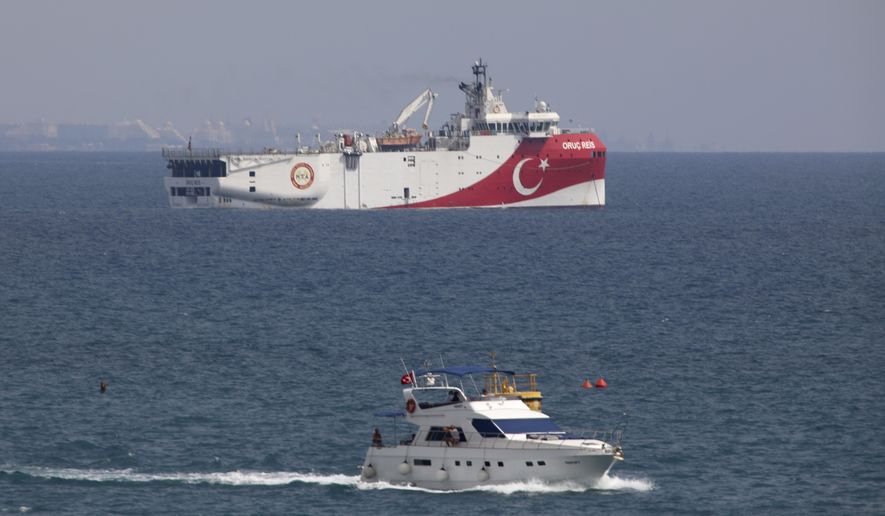ISTANBUL (AP) - The Turkish research vessel at the heart of a Mediterranean Sea energy dispute between Turkey and Greece is back in port in an apparent bid to ease tensions ahead of a European Union summit where potential sanctions against Ankara will be discussed.
In a tweet Monday, Turkey’s energy ministry said the Oruc Reis had returned to port in Antalya after completing seismic research in the Demre field. Ship tracker MarineTraffic showed the survey ship had docked.
Tensions between the two neighbors and nominal NATO allies escalated over the summer with a military build-up after Turkey sent the survey ship, escorted by navy frigates, into disputed waters in the eastern Mediterranean.
The move prompted Greece to also send its warships, and both countries conducted military exercises to assert their claims. NATO intervened, organizing technical talks between the two countries’ militaries to prevent a potential armed conflict. NATO foreign ministers are scheduled to meet Dec 1-2.
NATO Secretary General Jens Stoltenberg said he was still concerned with the situation and was working to reduce tensions by keeping lines of communication open, cancelling military drills and other measures.
“When the ship Oruc Reis is in port, as it is from today as far as I have been informed, that helps to reduce tensions and makes it easier to make progress also on deconfliction,” Stoltenberg told a news conference.
Ankara says Greece and the Greek Cypriot-led government on war-divided Cyprus are impinging on the energy rights of Turkey and breakaway Turkish Cypriots by setting maritime boundaries according to their own interests and attempting to exclude Turkey from potential oil and gas reserves.
Turkey says maritime boundaries for hydrocarbon resources should be calculated from the mainland. Greece invokes international law to say the continental shelves of its islands dotting the Mediterranean should be included within its energy zone.
The Cypriot government also accuses Turkey of unlawfully carrying out drilling and exploratory work in waters where it claims exclusive economic rights.
The competing claims have led to a diplomatic crisis and aggressive rhetoric. EU-members Greece and Cyprus, along with France, have called for sanctions on Turkey.
The Oruc Reis was pulled back to port in September for maintenance and resupply. Turkish officials said it was withdrawn from Greek-claimed waters to give diplomacy a chance. It was redeployed in October after Turkish President Recep Tayyip Erdogan accused Athens of failing to fulfill promises.
Turkey’s defense minister Hulusi Akar on Monday again accused Greece of “stubbornly avoiding dialogue and looking for solutions elsewhere.”
EU leaders are meeting for a summit on Dec. 10-11 and are expected to discuss the dispute and possible sanctions.
German Chancellor Angela Merkel hailed the return of the Oruc Reis to port as a “good sign,” but noted that Turkey was still carrying out drilling activities off Cyprus.
She said Turkey has engaged in activities of “a very aggressive character, or I would say provocative character” in the Mediterranean Sea. But she also said Turkey deserves “great respect” and support for hosting large numbers of Syrian refugees.
Separately, Greece, Egypt, Cyprus are conducting sea and air military drills in waters off Alexandria, Egypt, through Sunday. The Medusa exercise has been a component of the three countries’ cooperation pact since 2017, and is joined this year by France and the United Arab Emirates.
Greece and Cyprus have signed separate maritime border agreements with Egypt and all three countries have condemned Turkey’s actions in the Mediterranean. They dismiss a similar deal that Ankara signed with Libya’s Tripoli-based government as “legally invalid.”
___
Menelaos Hadjicostis contributed from Nicosia, Cyprus and Geir Moulson from Berlin.




Please read our comment policy before commenting.